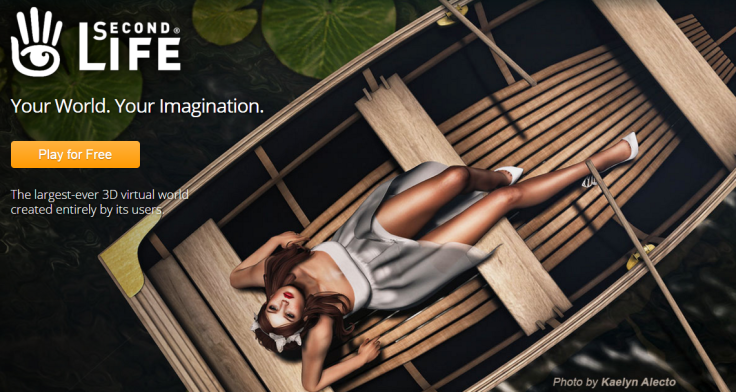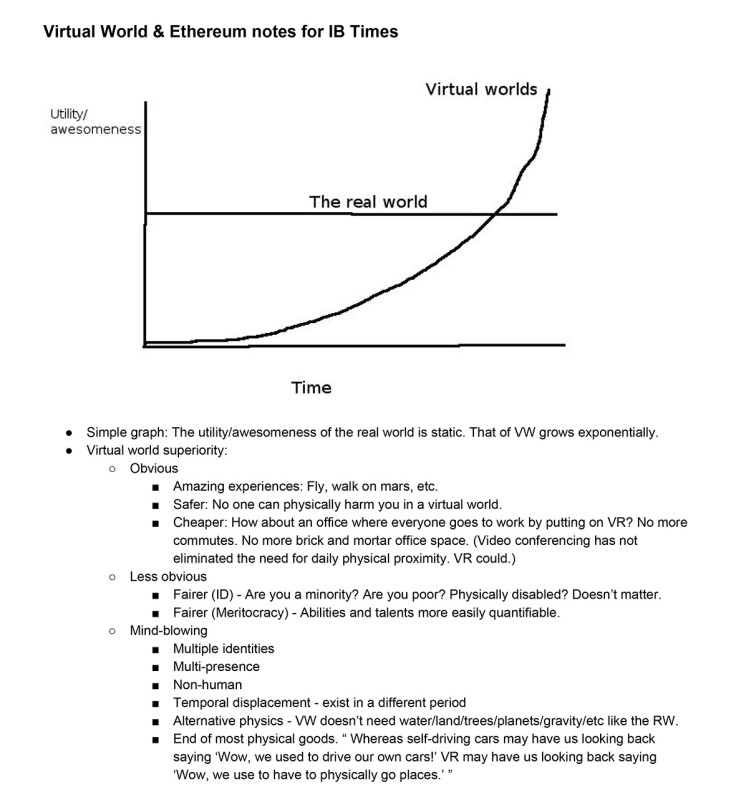Gaming the blockchain IV: Do virtual bankers dream of digital currency?

Blockchain technology is poised to revolutionise economic relationships the world over – so how will this play out in virtual worlds and virtual economies, which are about to experience something of a Renaissance?
The example of a virtual world complete with its own currency which everyone has heard of is Second Life, which some years ago touted the world's first virtual millionaire. As discussed in some previous articles on gaming and blockchain technology, gaming worlds tend to be siloed and, for the most part, the value of digital assets does not persist over time, but depletes rather quickly. Partly driven by new virtual reality hardware combining with games, the VR universe is expected to enter something of a mass expansion. Indeed, Second Life is about to launch a new version code-named Project Sansar, while new gaming platform Voxelus is about to release the first "App Store for VR" marketplace, which uses its own in-game cryptocurrency, the Voxel.
The major downside to virtual worlds is that they are currently centralised, points out Cyrus Adkisson, the founder of Etheria, a virtual world building game which runs entirely on Ethereum, the public blockchain which prefigures a decentralised future for the internet and everything connected to it.
Adkisson told IBTimes: "Just ask any of the five dozen companies that tried to create a World of Warcraft competitor. Even though WoW is now more than 10 years old and technologically inferior to those upstarts, it remains king because players' friends, (maybe family), possessions, accomplishments, expertise and general history are inside WoW.
"This is all generally fine for a game, but what about when virtual worlds start seriously replacing the real one? I don't want to live in a virtual world controlled by Facebook or Google. Just as people can't be fully functional in our society without an email address or phone, if the rest of the world goes virtual it'll be hard to resist which ever virtual world becomes dominant.
"My hope for blockchain technology, especially Ethereum, is that it can provide a trustless, decentralised platform for building a virtual world that everyone can use without fear of governmental or corporate Big Brother."
Adkisson was good enough to provide IBT with an infographic highlighting the compelling awesomeness of virtual worlds (see below).

Decentralised virtual reality might seem a a long way off, despite advancements in VR technology and its wide-ranging applications . But this sort of thing happens by degree: in terms of virtual world evolution, 2016 will see archetypal virtual world, Second Life, launch a new more immersive VR experience. The game's creators say the current iteration of Second Life has a GDP north of $500m.
Linden Labs has a unique experience of running virtual economy which started out as an entirely unfettered free market experiment and went on to bizarrely pre-figure the real world banking crash, which happened a year after Second Life's over-leveraged and unregulated financial services collapsed. Today a degree of centralisation and supervision is necessary, explains Ebbe Altberg, CEO, Second Life.
"Most games do not actually allow the conversion of tokens to fiat. We are very rare breed that allows users to actually convert and it comes with a huge amount of compliance work that we have had to do over the years to make sure that everything is legitimate. That the way people can use these tokens are within the laws of governing bodies that we sit under and there's no money laundering, for instance.
I think blockchain is a fascinating technology that over time we might use for a number of purposes, not necessarily just to carry currency or value, but managing contracts or IP rights or all kind of interesting things you could use it for.
Altberg said he is personally intrigued by Bitcoin but that it would have limited added value. "I would just treat Bitcoin for now as another fiat that you would convert from because we do have our own way of carrying value. I am more probably intrigued by the blockchain than I am by the bitcoin itself.
"I think blockchain is a fascinating technology that over time we might use for a number of purposes, not necessarily just to carry currency or value, but managing contracts or IP rights or all kind of interesting things you could use it for."
Altberg added that a renewed wave of interest in virtual worlds and games driven by clients like Oculus Rift – which Linden Lab's 2016 Project Sansar aims to ride – must allow for democratisation of the form. He said: "It needs to be democratised; it cannot just be technology developers and advanced engineers that can make this happen. We refer to ourselves as the 'Wordpress of VR', or like YouTube for VR, where anyone without sophisticated knowledge can create and experience and share it with other people, and also monetise that."
Another company that describes itself as "YouTube for VR" is Voxelus. This month it is launching a VR marketplace and the voxel cryptocurrency to trade upon it. The company said in a release it has partnered with Flat Pyramid and will integrate up to 7,000 Flat Pyramid VR assets such as non-proprietary graphics, images and 3D models, including still and animated characters and environments into the Voxelus Marketplace.
The voxel is a centralised cryptocurrency which draws upon elements of Uphold's technology and also called on Jim Blasko of Unbreakablecoin to develop the currency. Martin Repetto, co-founder and CEO of Voxelus told IBTimes: "It's a centralised coin unlike Bitcoin or Litecoin but having said that it is still an altcoin. We partnered with Uphold and they provide our wallets and also handle the exchange where you purchase more voxels.
Repetto said the coin was created for a pre-sale, which sold 0.6% of the total reserves for roughly $450,000. "We were doing the operations in Bitcoin so we got 1200 bitcoins for 1.4 million coins. So that gave a sort of blended market value of the coin right now at 0.62 of a dollar."
Unlike Playstation credit, for example, voxels don't lock you into the system because they can be exchanged back into fiat currency, said Repetto. Voxelus partnered with iconic cryptocurrency exchange shapeshift.io, which also assisted in running crowd sale. "With the voxel using cryptotech the money is yours – just converted into a different form of value which is the voxel. If you don't want to play anymore, if you want to go and sell it, you can."
Aside from questions of interoperability, any convergence of cryptocurrency, blockchains and gaming would also face the problem of scalability. Blockchains involve a network of nodes keeping a record of the state of given database, which could add a significant computational load to a massive multiplayer game.
Simon de la Rouviere, engineer of societies at ConsenSys, cautioned that with the current scaling of blockchain technology, you are not going to be able to run a whole massive multiplayer online game on a blockchain.
The future
"That future might still be far away, or might never come to fruition just based on how this technology works and how decentralisation can't scale to that level." He said games have many interesting possibilities now whereby the amount of stuff needed to decentralise is small and scalable, citing the work being done by Julian Pittleman on EtherPoker.
"It would be quite amazing if we could solve all the scaling issues to actually create a fully immersed virtual world with everything running on a blockchain in which people can participate and decide who they want to be, and try economic experiments – like the idea of Basic Income, for example.
"It would be strange to see will these alternate worlds where people expend all their economic activity. You do see that now to some extent: people spend their lives in World of Warcraft or Eve Online. This would give that idea more legitimacy."
© Copyright IBTimes 2025. All rights reserved.






















